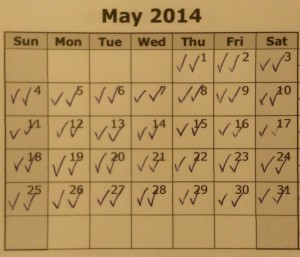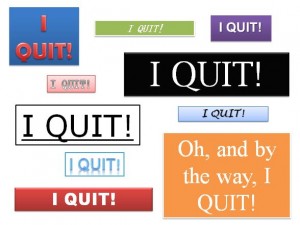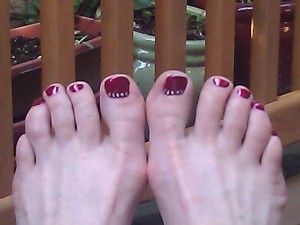Meaningful Work
If They’re Not Cheering For You, Ignore Them
In my last few days at my old job when everyone knew I was leaving, my coworkers were great. They were glad for me, they admired my decision and many were wistful because they wished they were leaving, too.
Outside of the office, it was a different story. When I happily shared the news with friends, their responses were often negative. One pal’s reaction was “Oh no, I’m sorry.” And then, “Why did you do that?” This was a guy who had listened to me complain for years about how exhausted I was from working all the time, who knew that I wanted something better for my life.
They weren’t trying to be mean; they just didn’t understand why I would leave a steady job to go write for a month and launch a business. They were a little concerned about the risk I was taking but mostly they were reflecting their own fear.
They were unhappy in their careers but afraid to make changes. They projected their worries about what would happen if they didn’t have regular jobs. The uncertainty was too scary.
I was disappointed that these friends didn’t celebrate with me, but I understood why. I also understood that I didn’t have to listen to their doubts. The cheering section was much more fun!
Once You Decide to Quit Your Job, You Might Enjoy it More Than Ever
It is a phenomenon that I heard over and over from people who I spoke to about quitting their jobs. Once they decided on a specific date to resign, they started enjoying their work again.
Most of these people were waiting for an event several months in the future, like receiving an annual bonus, before they announced that they were leaving. So while they knew that they were on their way out, their coworkers and managers did not.
This secret changed the way they thought, felt and behaved at work. One woman who spent half a year planning to quit her law firm said, “Those were the best six months of my career.”
These are the reasons why deciding to quit made employees like their work again:
They spent more time with coworkers they cared about. They knew that they weren’t going to see them five days a week anymore and would miss them. They made a point to stop by their desks to chat, eat lunch together and enjoy their company while they still could.
They stood up for themselves. On the flip side of missing their friends, there were other coworkers that they were looking forward to never seeing again. Until then, instead of ignoring or downplaying passive-aggressiveness or behavior designed to humiliate them, they told the offenders that it wasn’t OK to treat them that way.
They took more risks. All those great ideas that were tamped down out of fear of failure suddenly had new potential. Instead of going along with their managers’ terrible business proposals, they pointed out how different approaches would generate better results.
They set boundaries. They stopped working late nights and went home for dinner. They put their smartphones down and spent their weekends with friends and family, having fun and relaxing.
They kept it in perspective. Instead of getting worked up about the crap their bosses said, their long commutes and inane company policies, they reminded themselves that in a very short time it wouldn’t be their problem any longer.
All of this adds up to taking their power back. They had a lot less to lose since they were on their way out and wouldn’t be around to be punished in the next annual review. They stopped being afraid and started prioritizing their health, relationships and happiness.
Wouldn’t it be great if employees treated themselves with this level of self-respect all the time, not just when they are about to quit?
Three Things to Do When You’re About to Get Laid Off
If you think you’re going to get laid off soon, there are a few things you can do right now to be better prepared.
Don’t wait until you get the news – you might be upset or angry and forget to take care of important details while you have the chance. And don’t be overconfident. Just because your company may have given workers weeks’ long grace periods in the past, you never know when the policy will change and you’ll be asked to pack up your office and leave in an hour.
- Copy your contacts from your work computer’s address file to your home computer. All those coworkers, vendors and partners whose phone numbers and email addresses you filed on your work PC are part of your professional network. Regardless of where your career goes, keep your “rolodex”. And those personal names and numbers you stored in your work address book for the dentist and the pet sitter – save yourself the steps of having to recreate that information later.
- Print your most recent paystub and your December 31st paystub. You might need the details for mortgages or refinancing, for taxes, or for anything that requires proof of past earnings. Also, when you’re considering new job opportunities you can refer back to your paystub to add up the non-cash components of your total compensation. Employer-matched 401K’s, life/health/disability insurance, gym memberships, bonuses and stock should all be taken into account when it is time to discuss salaries. Being able to talk in detail about the total value of your past compensation package will help you negotiate with confidence.
- Calm down. Yes, facing a layoff can be scary. Career changes are disruptive and one that is not your choice may have extra discomfort because of the uncertainty of what you’ll do next. When you get consumed by your thoughts, just stop. Take a deep breath. You were hired for your last job and you’ll be hired again. Or you’ll start your own business. Or retire. Or take a break and figure out what you really want to do with the next years of your life. You’ll be eligible for unemployment benefits and probably get severance pay, so don’t waste your energy panicking about a financial disaster that probably won’t materialize. This could be the best thing that ever happened to you.
Of course there are more things you can do before you walk out your company’s door for the last time. But for now, take these steps. And then go to work tomorrow knowing you’re a little more prepared. You got this.
People underestimate the importance of their work environments
Is it just me, or does anyone else find a picture of a person with their laptop and their feet in the sand disturbing? The glare from the sun, specks of sand getting on the keyboard, wind and bugs. And why not get your work done first and then go outside on the beach?
I’ve heard people say to knowledge workers, “you should be able to work anywhere.”
Sometimes this is said to employees who sit in ugly, gray cubicles with bad lighting and lots of noisy distractions. Or to temps and consultants who are asked to be productive in cramped vendor bays with six other workers and slivers of desk space, with chairs and desks that don’t adjust in height. One team that I worked with asked a vendor to do his work from a table squeezed in a narrow hallway until the fire marshal said he had to move.
It is true that you can take your laptop anywhere with a wireless connection and be able to send email, and work on documents, spreadsheets and PowerPoints. But there’s more to it than that.
I’ve met many consultants, writers and entrepreneurs who love to work out of coffee shops. Some of them hunker down in their favorite café, day after day, until they are so familiar with the staff and other regulars that they are almost like coworkers.
Other people I know – the writers especially – have a series of hangouts that they’ll visit throughout the day. They’ll write for a couple of hours at one spot, then move to the next.
For me, my home office is the best place for me to work. I constantly refer to the marked up printed pages of my manuscript on my bookshelf. The sticky notes that outline my chapters are in rows on my filing cabinet. Each time I make a change to the order or content of each chapter, I update the notes. Technically, these things are paper and I could move them from place to place. Psychologically they’re the structure of my book and I need them in order and easy to reach.
For my consulting work, I also have hard copies of files that I refer to frequently. I have headphones for conference calls, a smart card reader, backup drives and my printer/scanner. Plus, an ergonomic mouse, keyboard and footrest. Anyone who’s had carpal tunnel, tennis elbow or wrist injuries from overusing a regular keyboard and mouse will understand how non-trivial these things are. Non-trivial and not very portable.
Beyond the physical elements that make me productive in my own office, there is the benefit of a consistent routine. When I sit down at my desk, my brain knows it is time to get to work. It’s where I’m able to focus most consistently and repeatedly, day after day.
So while technically it is possible to work almost anywhere with a laptop and wireless connection, how effective is it? And more importantly, do you want to?
Employee Stress vs. Entrepreneur Stress
I had stress when I worked a full-time corporate job. I have stress now. What’s the difference?
Corporate stress came from unrealistic workloads, office politics and being asked to participate in business decisions that I disagreed with. Working in a stressful environment is like breathing in low levels of poisonous air every day. It won’t kill you all at once. It is a long, slow decline.
Entrepreneur stress is completely different. It is the flip side of the positives parts of working on my own. It comes from the pressure I put on myself to spend more time on my projects. It’s learning Quickbooks and all kinds of marketing and operational tasks that I used to have corporate resources to help me execute. It’s the uncertainty of not having a scripted career path.
This kind of stress is much easier to live with. I can decide how many hours to spend on my business and writing projects. I can outsource tasks that aren’t my strong points and that I don’t enjoy doing. I can tame my thoughts when I worry.
All stress is not created equal.
Making Progress
 I recently completed my first month of the Chain Habit. It was so easy that I wish I started a long time ago. It’s as simple as making a commitment to take a specific action every day, no matter what. My commitments are “one book sentence, one blog sentence.” Small and achievable.
I recently completed my first month of the Chain Habit. It was so easy that I wish I started a long time ago. It’s as simple as making a commitment to take a specific action every day, no matter what. My commitments are “one book sentence, one blog sentence.” Small and achievable.
Admittedly, some days are easier than others. My best days are when I get out of bed around 6AM and get right to work on revising my manuscript or writing a blog post. Other days, like yesterday, I feel such resistance that I didn’t open my word document until late in the evening. I’m working on a chapter about being financially prepared before quitting a job, and the individual topics aren’t flowing together easily. All day instead of working on this chapter, I imagined myself staring at the pages, not knowing how to fix them. It was overwhelming.
That reluctance carried over into everything on my to-do list. I felt immobilized all day, unsure of which project or task to work on from one moment to the next. I didn’t feel like doing anything, yet was propelled by anxiety to do something. Finally, at 9:30PM last night, I opened my word document and worked on my manuscript. I deleted some sentences, moved paragraphs around, and created a completely new worksheet to help people estimate their current and future expenses. Progress.
Revising my manuscript isn’t the hardest thing I’ve done – not even close. I like the process of editing. In fact I recently revised two bulky process documents as part of my consulting work, and enjoyed doing it.
You know what the hard part of reworking my book is? Sitting in my chair, opening my word document and doing it. Finding the inner motivation is the hard work.
As I mentioned, it’s easier when I get started first thing in the morning. It also helps when I take a piece of notepaper and write down what I want to accomplish the night before. And receiving a compliment about my writing is often enough to make me stop whatever else I’m doing and start working on my book or a blog post. Is that a character flaw that external praise makes me get to work? I don’t care if it gets one more page out of me.
As an aside, I took Samuel Delaney’s workshop at the Summer Writing Program last summer. His perspective was that criticism is a better motivator than praise. His reasoning? After one of his books got outstanding reviews, he did nothing but walk around smiling for three days. And then he read a harsh review that was so unsettling to him that he immediately went to his desk and got to work again. He’s one of the most prolific authors I’ve ever heard of, so clearly that worked for him. I’m going to stick to the positive reinforcement.
As another aside, it was in Delaney’s workshop that I started writing my book.
Another character flaw is that it motivates me when I read something that I don’t like from an author who has sold a lot of books or who has great endorsements. It makes me think that my own book doesn’t have to be a masterpiece; it just needs to be published. And then I get back to work.
It took me thirteen hours before I did any writing and editing yesterday. And I suffered needlessly all day while I put it off. But I finally revised a few pages, and worked on a blog post and now I get to make two check marks on the calendar propped up next to my desk. Whatever works.
Multiplying by Zero
 Years ago I was working for a company that I cared about enormously. I was loyal and worked hard and really wanted to be there. But during the last year or so of my employment, things got weird.
Years ago I was working for a company that I cared about enormously. I was loyal and worked hard and really wanted to be there. But during the last year or so of my employment, things got weird.
I would do something very well and it would be ignored. For example, the company used logos that were different sizes and fonts. I changed them to be consistent and not only did it look better, but it eliminated an entire set of decals that were being printed and stored, which saved about $5,000 every month. The reaction was somewhere between a yawn and a blank stare.
Another time I was chastised for not going out to dinner with a group of salespeople the night before a customer event. I skipped the dinner because I was at the office making final preparations late into the night. I prioritized making sure details were in place for a successful event. They prioritized the social aspect of having an evening out with their coworkers. I was told that it seemed like I wasn’t a team player. Huh? The event went well, anyway.
This stuff was so strange to me. I liked most of the people that I worked with and it was confusing to have people that I cared about say and do things that just didn’t make sense.
I will never forget the advice I got during a graduate school leadership class. I was explaining the situation to one of my classmates and he said that he had a job that was like that once. I asked him how he resolved the problem. His answer was “I quit and got a job somewhere else.”
That statement shifted my thinking. I had put all of my energy into trying to understand the situation and fix it because I truly wanted it to work out. I started to realize that no matter how much I wanted it to get better and despite believing that my work benefited the company, I was only part of the equation. Maybe that seems obvious to other people, but until then I kept thinking that if only I could figure out what to say or do, the people around me would act more rationally.
Not long after the conversation with my classmate, one of the vice presidents at the company bought everyone a copy of the book Who Moved My Cheese by Dr. Spencer Johnson. It’s a parable that basically says, “If you’re no longer getting what you need in your current environment, go get it somewhere else.” The minute I put down the book I picked up the phone and called a staffing company. I made the call on a Monday and on Friday I interviewed for a consulting contract. I was hired the next Monday. Eight months after that I took a full time position and spent another twelve years working there.
Most of my thirteen years there were great. The last few were not. Again, I had years invested in the company and there were enough good things about it that I kept looking for jobs on other teams and waiting for the next reorganization to see if it would make things better. None of that worked. I came up with my own analogy: it was like multiplying by zero. It didn’t matter how many hours I worked or what impact my programs had on the business. Everything that I did was cancelled out because where it intersected with the organization was like multiplying by zero. The end result is always the same. Zero.
One year ago today I quit that company. Now my happiness is multiplied each time I find projects that align with my values: working with people I respect, flexibility to work at home, the ability to make an impact through my projects and fair pay.
It isn’t always easy on my own, but the math makes sense.
Ten Benefits of Working From Home
10. Feeling self-righteous about reducing my carbon footprint by not driving to an office every day.
9. The cafeteria is my kitchen and it’s always open.
8. No awkward chitchat in the restroom.
7. My work at home uniform = track pants and a t-shirt.
6. Wearing big ugly eyeglasses and not caring what I look like.
5. My office could not be better suited to me than if I had designed it myself…oh wait, I did design it myself.
4. Being at home for the plumber, the electrician and front door deliveries.
3. Not wearing shoes. Or makeup. Or a bra. And I’m not embarrassed to admit it because I’m not going to see you at the office anytime soon.
2. Less time commuting = more time to procrastinate working on my book.
1. Running after the cat with paper for him to throw up on as soon as the gagging noise starts. Seriously. When I make it in time I feel like a winner. I won!
Opting Out or Opting In?
A few months ago someone asked me if the change I made in my career was opting out of something or opting in.
Great question. The answer is both.
I opted out of a work environment that no longer fit me. I said no to long, exhausting hours spent on tasks that were required for my role but that I didn’t believe in. I said goodbye to a false sense of security that comes with a company job. I left work that I enjoyed because the price I paid for doing that work wasn’t worth it anymore.
I opted in to choosing work that supports the kind of life I want to live. I said yes to deciding how to spend my time and energy. I said hello to feeling both uncertain and exhilarated about the possibilities for my future. I began writing and consulting work which isn’t always fun but is worth every moment.
Sometimes it is about saying no in order to say yes.
Finding Your Passion is Overrated
![]() The whole “finding your passion” blitz is getting on my nerves. There’s an onslaught of books, classes, blogs and life coaches all telling us that there is a specific reason we’re on this Earth and we should be spending time and money figuring out what that is. In fact, if we’re not able to articulate our life’s passion in a mission statement format there’s something lacking in our lives and we’ll never be happy until we figure out what it is.
The whole “finding your passion” blitz is getting on my nerves. There’s an onslaught of books, classes, blogs and life coaches all telling us that there is a specific reason we’re on this Earth and we should be spending time and money figuring out what that is. In fact, if we’re not able to articulate our life’s passion in a mission statement format there’s something lacking in our lives and we’ll never be happy until we figure out what it is.
I met a life coach at a networking event a few weeks ago who seemed annoyed when I shared my thoughts on this topic. She informed me that her job was to help people find their passion whether it was their work or a hobby. “If you talk to someone long enough, you eventually find what lights them up,” she said.
OK, well that’s great if some people need helping figuring out what they’re interested in at $90 an hour. But I don’t need a coach to know that I light up talking about animal welfare issues. I’ll talk to you for a half-hour about what makes a good or bad sanctuary and then I want to stop talking about it and go on with my day. I like to visit sanctuaries and donate money to them and sign online petitions but I’m not compelled to do anything else about it. Maybe someday. Or maybe not.
When I conducted interviews for my book, I met people who are living their passion after quitting their corporate jobs. One woman’s most important hobby was scuba diving. She bought into an existing scuba business and now spends her work and leisure time on her favorite activity. I love those stories and think people who have a clear conviction about what they want to do with their time are fortunate to have a singular focus.
But I’d like to reassure the rest of us that there’s nothing wrong with our lives if we don’t have a specific calling. Maybe it’s more important to be happy, satisfied and at peace with our daily lives.
Don’t get me wrong, I’ve been an avid consumer of the “find your passion” type of book and class and coaching for years. Life coaches are a great resource for gaining clarity and taking action to increase satisfaction with our lives and I think that is more important than pursuing a validation for your life that you might never find.
Coaches are also helpful to overcome blocks. My sister, Kristen Sutich, is gifted at coaching me to feel at peace during difficult times and helps me make plans that sustain my goals. (She specializes in grief issues and helping moms send their kids to kindergarten, but I recommend her for general life coaching, too.)
I also took a tele-class this fall called “Find Your Calling Now”. It was led by Martha Beck who is my author-idol and whose books have inspired me for years. In the class, Beck talked about the Hero’s Journey, which the geeky writer in me loved, but in the end, I was nowhere closer to finding my life’s calling than before.
During the time period when I took the class, I was writing my book, working on a small startup company and spending a LOT of time wondering what the hell I was doing with my life. Even though I believed in the value of my projects and still do, they are not my life’s burning passion. I don’t jump out of bed at 5AM every morning because I’m filled with excitement to revise my book. My book is important to me but it isn’t magic. It takes energy and focus and discipline to work on it. It is similar with the startup business. The business model is compelling, but it doesn’t drive me.
At the present, I’m the happiest I’ve ever been with my work life. My main consulting gig provides interesting work that pays the bills, my clients are nice and I work from my home office. The freedom of doing my work in my own space is a huge part of my happiness. I make a healthy breakfast and lunch every day and can take a break to go for a walk from my own front door. I drive to the office for meetings and make a point of checking in with people when I’m there instead of taking for granted that I’ll see them each day. This arrangement also gives me the time and energy to work on my other projects outside of business hours.
 It took trial and error to get to this point. In some ways, my life resembles the one I had a year ago. I’m doing marketing for the same company that I left last June. I’m even in the same office complex – how weird is that?! But now I’m billing my hours from my home office as the owner of my own consulting company and that is a world of difference.
It took trial and error to get to this point. In some ways, my life resembles the one I had a year ago. I’m doing marketing for the same company that I left last June. I’m even in the same office complex – how weird is that?! But now I’m billing my hours from my home office as the owner of my own consulting company and that is a world of difference.
It is a satisfying feeling to look back at the week with gratitude because every day was a great day. Am I living my life’s passion? No. But I’m deeply happy. And that’s more than enough for me.



Recent Comments